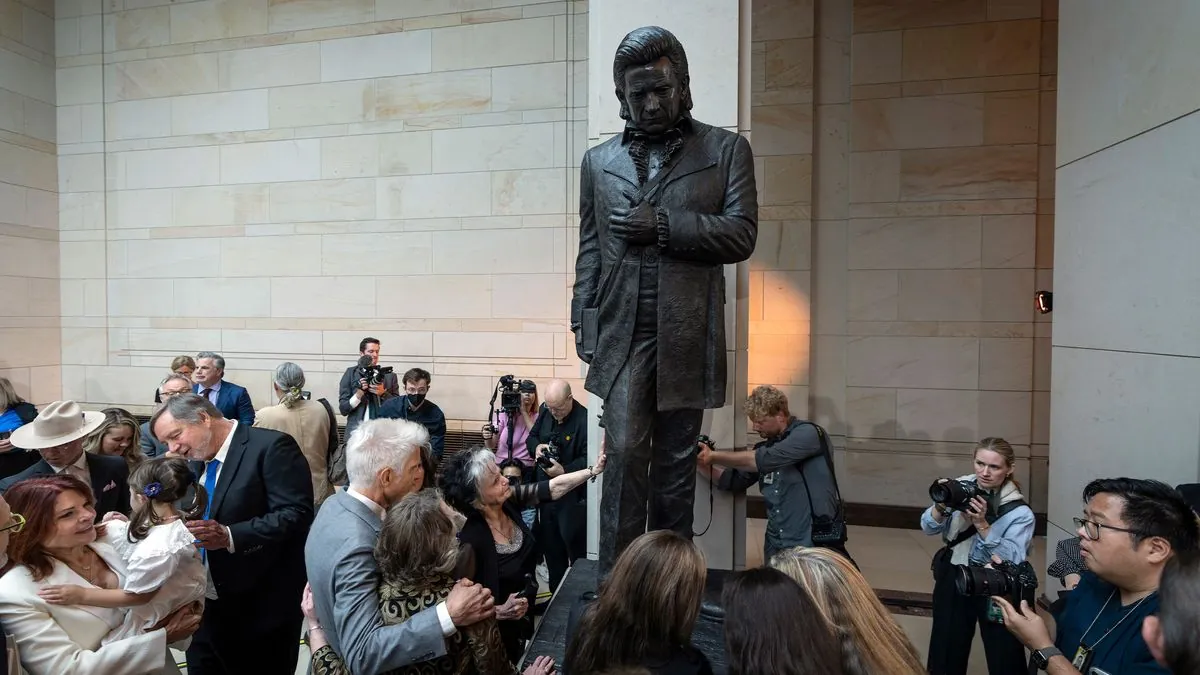A monumental tribute to American music icon Johnny Cash was unveiled yesterday at the U.S. Capitol. The nearly 11-foot bronze statue, donated by Cash's home state of Arkansas, stands as a testament to the enduring legacy of the "Man in Black."
Johnny Cash, born on February 26, 1932, in Kingsland, Arkansas, left an indelible mark on the music industry, spanning genres from country and rock to blues and gospel. His influence extended far beyond his music, as he became known for his advocacy for prison reform and Native American rights.
The statue, located in Emancipation Hall at the U.S. Capitol Visitor Center, depicts Cash at approximately 40 years old. It portrays him holding a Bible, with an acoustic guitar slung over his back, capturing the essence of his multifaceted persona. The sculpture includes inscriptions featuring lyrics from his song "Man in Black" and a quote emphasizing his choice of love over hate.
Rosanne Cash, one of Johnny's children, described the unveiling as "one of the most remarkable days of my life," with over 100 family members in attendance. This familial support underscores the deep impact Cash had not only on the music world but also on his loved ones.
The statue's creator, Kevin Kresse, a Little Rock-based artist, meticulously crafted the likeness using measurements from Cash's tailor and consulting with his family. This attention to detail ensures an accurate representation of the music legend.
Rep. Rick Crawford highlighted Cash's unique ability to "capture the voice of a generation, of a region, or even a culture" through his music. Cash's willingness to address controversial issues and share his personal struggles contributed to his status as an "American classic."
Johnny Cash's career reached new heights in the late 1960s with his live albums recorded at Folsom and San Quentin prisons. These performances not only boosted his popularity but also fueled his advocacy for humane treatment of prisoners. Cash's impact extended to television, where he hosted "The Johnny Cash Show" from 1969 to 1971.
Throughout his career, Cash received numerous accolades, including 18 Grammy Awards and induction into multiple music halls of fame. He wrote over 1,000 songs and even recorded in unusual locations such as caves and Alcatraz Prison.
The statue's placement in the National Statuary Hall Collection marks a significant milestone, as Cash becomes the first musician represented among the historical figures. This collection, which includes up to two statues from each state, features notable individuals such as Helen Keller and Billy Graham Jr.
Cash's statue replaces those of Uriah Milton Rose and James P. Clarke, 19th and early 20th-century figures associated with Confederate loyalty and white supremacist views. This change reflects a broader national discussion on public memorialization.
Johnny Cash's legacy continues to resonate more than two decades after his passing in 2003. His final album, "American IV: The Man Comes Around," released in 2002, featured his haunting cover of "Hurt," cementing his ability to connect with new generations of listeners.
As visitors to the U.S. Capitol encounter this imposing statue, they will be reminded of Cash's profound impact on American culture, his advocacy for the marginalized, and his enduring musical legacy. The Man in Black, now immortalized in bronze, stands as a symbol of artistic integrity and social consciousness for future generations.
"One of the most remarkable days of my life."
